Character Select: Wakka
Name: Wakka
Game: Final Fantasy X (2001)
Species: Human
In his own words: “Traitors, coming through!”
This article contains spoilers big enough to destroy a small island village.
The JRPG has many strengths as a narrative medium. JRPGs are very long, for a start, meaning their stories have room the spread their wings. They also tend to be geographically huge and have diverse landscapes, so the player gains a sense of the vast and complex world that they need to save. But perhaps more than anything else, a JRPG’s unique storytelling abilities rest with its central party.
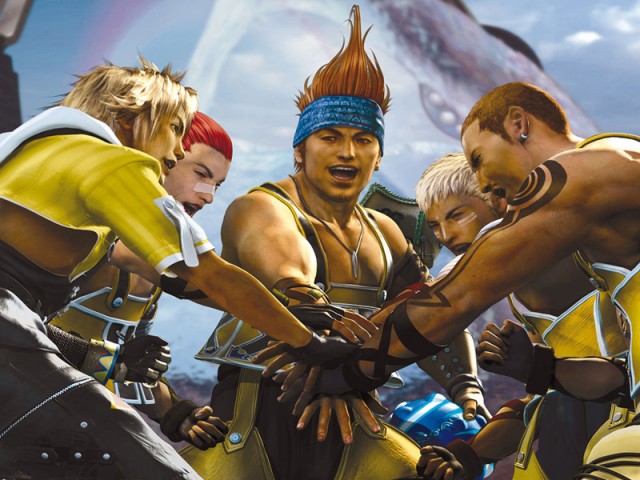
Wakka (centre) is a pillar of the community.
In few other genres do players get to spend so much time with so many characters, and rarely do they get to play with them all and have such control over their behaviour and development. Plenty of action and adventure games use companions as an excuse for much-needed dialogue outside of cutscenes, but it’s really only in a JRPG that an ensemble cast can be used to long-term narrative effect.
To date, Final Fantasy games have generally used parties to tell the stories of the worlds by using each member as a vocal representative of a race, faction or viewpoint. Because the worlds tend to be large ones with complex histories and long-standing political tensions, without party members to articulate the concerns of various groups, they would lack a human (or Ronso, Moogle, Viera) edge. Final Fantasy X’s cast are a great example of this, and a good thing too because the story is a complex one about the relationship between church and state that would be both baffling and impersonal without well-drawn characters to show the player what’s at stake.
Final Fantasy X is the story of Spira, an island world plagued by a vast physical manifestation of despair and destruction that appears every few years and lays waste to the land, known (in an interesting piece of Japanese to English translation) as “Sin”. The only people capable of defeating Sin are the summoners, devout followers of the religion of Yevon. To succeed in this undertaking, summoners must make a pilgrimage across Spira collecting powerful Aeons before confronting Sin. Most fail, but those who succeed not only sacrifice their lives in the process but are only partly successful: Sin always returns. Final Fantasy X explores the political, moral and emotional aspects of this story with a cast who, between them, give voice to the tensions within it.
Young, beautiful Yuna is the summoner whose Aeon-collecting quest provides the traditional JRPG story structure with its MacGuffin. She exemplifies the immense courage and selflessness required for the task, not to mention a reverent respect for the teachings of Yevon. Her father, Braska, was the last summoner to defeat Sin and consequently she also provides a link to Spira’s history. Auron, once Braska’s guardian, is now Yuna’s. Held in almost universal acclaim, Auron seems to have earned the right to speak out against Yevon’s doctrine, at least amongst friends. He represents both the skepticism of the politically astute and the freedom of the famous to express it.
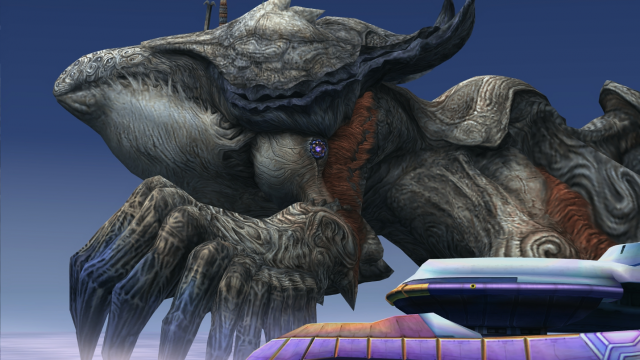
“Sin” is not really an abstract concept in Final Fantasy X.
Rikku is an Al Bhed, a race of secular scavengers ostracised from Spiran society for their use of machina (machines), which are strictly forbidden by Yevon’s teachings. Beneath Rikku’s squeaky exterior lies a balanced, thoughtful pragmatist who makes the best of every situation, characteristics which reflect the manner in which her people have turned their precarious status as a race of outcasts into one of self-sufficient independence. Kimahri is a broken-horned Ronso. Ridiculed and rejected from his Ronso family but resolute in his devotion to Yuna, he represents not only the Ronso’s fierce tribalism but also the strength of character required to live outside mainstream Spiran society. Tidus doesn’t come from Spira (that’s another story), but as the character the player controls throughout, he acts as their voice in the game, asking questions about the world and expressing anger at what he sees as a slightly irrational society too reliant on tradition and customs for its own good.
For their part, Wakka and Lulu, who grew up with Yuna on the idyllic island of Besaid, represent the normal citizens of Spira. Like Rikku, Lulu is a pragmatist with a keen sense of perspective, but unlike the younger guardian, Lulu maintains a respectable place within the mainstream. Though events in their quest uproot her understanding of the powers that shape the world, her motives for undertaking the quest (protect and support Yuna so she can do what she has resolved to do and defeat Sin) remain unshaken throughout.
The subject of this week’s Character Select, Wakka, is a simpler character with more complex motivations. He, like almost all guardians and the summoners they serve and protect, is a follower of Yevon, but unlike Lulu, he uses its teachings as a substitute for critical thinking. For Wakka, Yevon not only provides the practical means to save Spira from terror and destruction, but also answers. In Yevon, Wakka can find meaning in both Spira’s almost unbearable situation and his own heartbreaking losses.
This approach to the religion to which he has freely given himself (many guardians do not survive their summoner’s pilgrimages) can perhaps be traced back to the death of his younger brother Chappu. Chappu, who was engaged to Lulu and would do anything to protect her and secure their future together (“While being with your girl may be good, keeping Sin away from her is better,” he is reported to have said), launched an attack on Sin armed with a forbidden machina weapon. The assault failed and he was killed. Distraught by his own loss and the unfairness of Lulu and Chappu’s situation, Wakka blamed Chappu’s blasphemy and his already devout adherence to the teachings of Yevon tipped into fundamentalism.
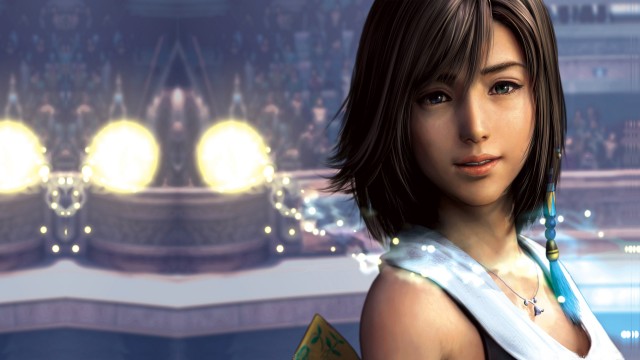
Yuna is like a younger sister to Wakka.
Wakka thus represents the segment of Spira’s population who, made impotent by the inconceivable power of Sin, seek to rationalise its horror by placing all faith in the one body that claims to provide salvation. If the senseless waste of Chappu’s life is to mean anything to poor Wakka, it is that Yevon’s anti-machina teachings should be followed at all costs. This is why he harbours a deep resentment of the Al Bhed and is deeply distrustful of Rikku despite her never having acted in a manner that warrants it. Indeed, his xenophobia is the reason why Lulu and Yuna have hidden the latter’s Al Bhed heritage from him all her life.
His pigheadedness is frustrating and his racism repellent, but never is Wakka condemned by the narrative. In fact, his badly-reasoned prejudices are made more interesting (if not actually forgiveable) by the fact that he’s such a nice bloke. He provides brotherly protection to Yuna, selflessly puts his life on the line to become her guardian and provides a sense of community for Besaid as the captain of Besaid Aurochs, the island’s Blitzball team. When Tidus is washed up on Besaid’s sandy shore, it’s Wakka who takes him under his wing. Even if, as Lulu suggests, this is because Tidus looks so much like Chappu, his warmth and openness to the newcomer is vital to the player’s identification with and desire to protect Spira in the early hours of the game.
So when Wakka shows such irrational hatred towards the undeserving Al Bhed, it brings Yevon’s influence over Spira’s population into question. With his provincial upbringing, Wakka is representative of a vast swathe of the world: A collection of islands united in their fear of Sin and the hatred of machina that such fear fosters. It’s through Wakka that the dysfunction underpinning society and preventing it from developing is revealed to the player. For what are machines if not signifiers of a culture’s ability to grow and improve itself through learning?
If Rikku represents an alternative way of life separate from the Spiran mainstream (secular and progressive), then Wakka represents the status quo (traditional and insular). In between the two is Yuna, who may be a symbol of Yevon’s wisdom and benevolence, but has secret Al Bhed heritage that makes her well aware that not everything is as it seems. She’s also motivated by a profound rationality for one so young, certain that her life is a worthy trade for few years of peace. “Don’t say it isn’t worth it,” she says to Tidus when he first discovers that a summoner must die in order to defeat Sin. “Because… it is.”
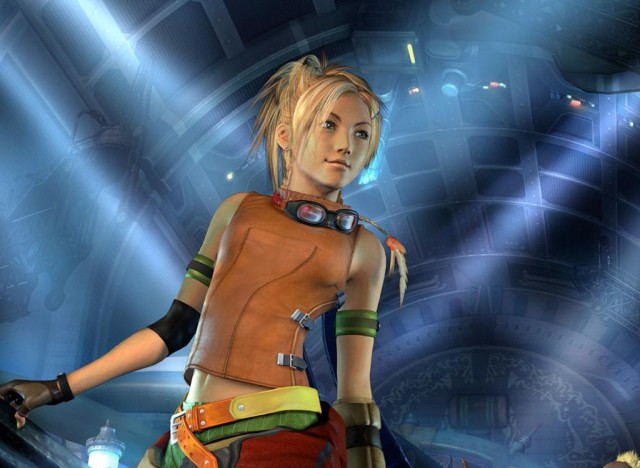
Rikku often comes to blows with stubborn Wakka.
In contrast, Wakka is driven by the vaguer notion that Yuna’s pilgrimage is the right thing to do according to Yevon’s teachings, alongside the darker, more pervasive need to find meaning in the loss he has suffered. Consequently, he welcomes Yevon’s prescriptive doctrine. “Sin”, he explains to player-avatar Tidus, “is our punishment for letting things get out of hand”. “Things”, in this case, refers specifically to the machina, but also in a more abstract sense to the progress and independence that machina allow.
It’s in this line that Final Fantasy X’s harshest criticism of religious dogma lies. Yevon teaches Spira’s populace that they need to “atone” in order to get rid of Sin forever. In other words, they need to keep quiet and behave, which keeps them in a permanent state of convenient subjugation. The effect this has on their critical faculties is made clear in an argument between Wakka and Rikku that takes place when he finds out that his chirpy companion is in fact an Al Bhed “heathen”:
Wakka: “Sin was born because people used machina!”
Rikku: “You got proof? Show me proof!”
Wakka: “It’s in Yevon’s teachings! Not that you’d know!”
Rikku: “That’s not good enough! Yevon says this, Yevon says that! Can’t you think for yourself?”
Wakka: ”Well, then, you tell me! Where did Sin come from, huh?”
Rikku: “I don’t know!”
Wakka: ”You bad-mouth Yevon, and that’s all you can come up with?“
Rikku: “But… that doesn’t mean you should do whatever they say without thinking! Nothing will ever change that way!”
Wakka: “Nothing has to change!”
Rikku: “You want Sin to keep coming back? There might be a way to stop it, you know!”
Wakka: “Sin will be gone once we atone for our past mistakes!”
Rikku: “When? How?”
Wakka: “If we keep faith in Yevon’s teachings it will be gone one day!”
Rikku: (sighs) “Why do I even bother…”
Here, Wakka shows how his ability to reason has been eroded by Yevon’s claim to provide both salvation and answers. Not only have they taken away his responsibility to draw his own conclusions, but actively discouraged him from doing so. Sin is a punishment because they say it’s a punishment, and their authority on the matter seems to come from lack of evidence to the contrary rather than proof that they deserve it.
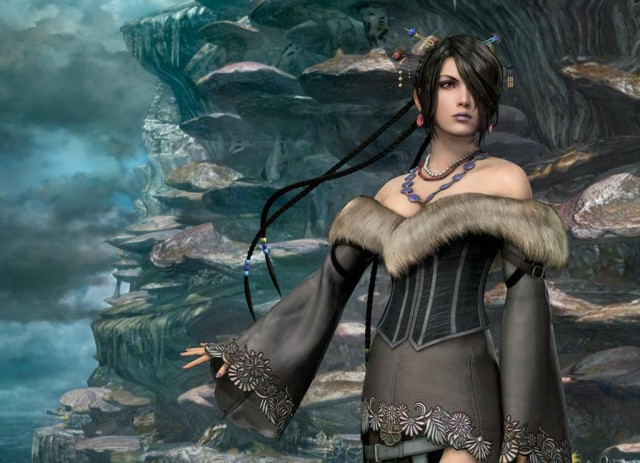
Lulu is Wakka’s more pragmatic counterpart.
In the first half of the game, Rikku, and to a lesser extent Auron, provide rational arguments against the kind of blind faith that Wakka exhibits. Initially, these just seem like narrative counterbalances that elevate the story of Final Fantasy X above Star Wars’, for example, which depicts a world in which faith in something the audience is told (rather than shown) is good, results in a straightforward triumph of good over evil. But later on in the game, things get more complicated. We discover that Auron always knew more than he let on, not just that Yevon is not just based on a lie, but one which its authority figures (high priests known as “Maesters”) always knew about.
Unlike real-life holy doctrines that revolve around a belief in something no-one knows for sure exists or doesn’t (for, of course, proof denies faith), Yevon is most definitely based on a lie. Not Sin, which is real (and ugly) enough for everyone to fear, but the method by which it can be destroyed for good. For while a summoner’s sacrifice does indeed result in Sin’s defeat for a few years, what the Maesters know and take great pains not to reveal is that this sacrifice also gives Sin the means to regenerate and return anew. The devout summoners’ temporary success, Sin’s inevitable return and Yevon’s monopoly on the means of deliverance keeps the Maesters in power.
In fact, one of Yevon’s best-kept secrets is the fact that their Grand Maester, Mika, is an “unsent”, a person who should, by rights, be dead but refuses to transition to the Farplane, Spira’s afterlife. The Maesters also exercise hypocrisy in their use of machina when it suits them (“just pretend you didn’t see them”, threatens the creepy Maester Seymour). In order to retain their free pass to exercise these unnatural and blasphemous privileges, the Maesters must maintain the illusion that they’re the only thing keeping Spira from total destruction. Yevon, it transpires, is their means of doing so: a façade that empowers the old and undeserving while keeping the rest of the population subdued.
The discovery of the truth behind Yevon is devastating for Yuna and Wakka. But while the former cannot bear that she has been complicit in Yevon’s bankrupt provision of false hope to its people, Wakka is filled with a more personal confusion and rage. Because he has based all his decisions on the teachings of Yevon, Wakka struggles to separate the tasks he must accomplish (protecting Yuna and saving Spira despite becoming an outlaw) from those that become meaningless without the foundation of Yevon’s lies (rejecting machina and hating the Al Bhed). The discovery also means that Chappu’s death really was a senseless waste, and that poor Wakka must find a way to move on from it that does not involve a simple explanation and an easy solution.
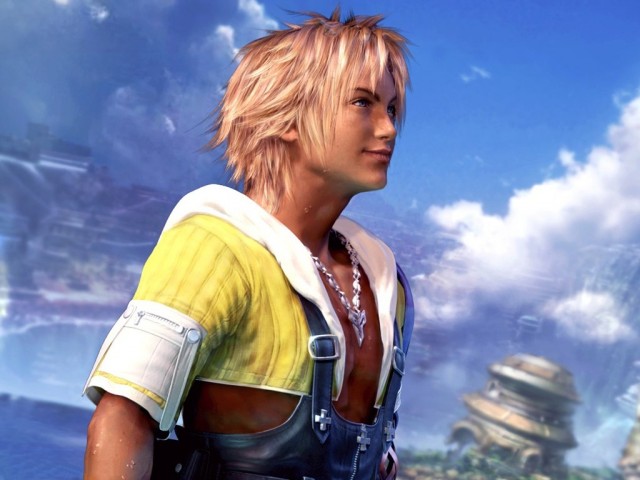
Tidus continues the series’ tradition of spiky hair and meteorological names.
This is a Final Fantasy game of course, so the story has a happy if bitter-sweet ending: Sin is destroyed forever, Yevon is disbanded, Yuna lives on and Wakka marries Lulu. The story is so full and satisfying that it doesn’t need a moral (no good story does, really), but if there is one it’s that one should exercise critical thinking at all times and not rely on authority figures to do it for you; they may not have your best interests at heart. After all, just because it’s always easier to be told what to think and do than to figure it out for yourself doesn’t mean that it’s ever a good idea to let that happen.
It’s Wakka who exemplifies this, and it’s a powerful, subversive lesson. Of course, he has it easier than us in that the truth behind his religion is revealed to him in no uncertain terms by one of its most mythic characters (the almost immortal spirit of the first summoner to defeat Sin, Lady Yunalesca), which forces him to learn to think for himself. On Earth, we don’t have it so easy. Many of us will go our whole lives without empirical proof that things we’ve been told by the powers that be (church, state, parent, employer, school, press) are true or otherwise. This means it’s up to us to retain a healthy skepticism without ever losing our sense of justice and the kind of selfless love that keeps Wakka from abandoning Yuna and his friends even when all seems hopeless.
*****
If you enjoyed this article and would like to read more on the subject, I recommend the essay “Sin, Otherworldliness and the Downsides to Hope” by David Hahn. It can be found in the indispensable volume Final Fantasy and Philosophy: The Ultimate Walkthrough, edited by Jason P. Blahuta and Michel S. Beulieu (Wiley, 2010).





